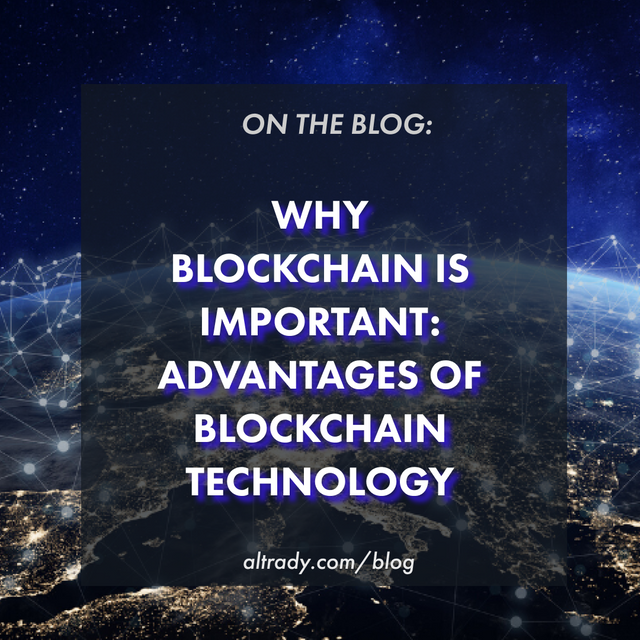
They say that blockchain is a revolutionary technology that can pave the way for positive changes. As a relatively new development with continually explored applications, we must know how we could benefit from it.
If you are buying and selling Bitcoin through a crypto trading software, then you also better understand how blockchain works and what benefits you can get from such a financial technology.
Here are some of the advantages of blockchain:
Verifiable & Accurate
Blockchain technology allows us to remove human factors in the processing, recording, and management of transactions. By eliminating human involvement and by relying on the computing power of thousands, if not millions of networks, we substantially improve the accuracy of the information that we get from the blockchain.
Know that for an error to spread across the blockchain. There has to be at least 51% error in the network of computers. Why is this so? That's primarily because the database can be replicated by each network in the blockchain. Copies of the database are used to verify the authenticity and truthfulness of each transaction. So even if one computer were to make a computational mistake or if a single node suddenly goes offline, this would not affect the integrity and accuracy of the information. An error can only happen if the majority or at least 51% of all the copies of the database have been changed - a practically impossible event.
Secure, Stable & Immutable
Once blocks have been confirmed and have been linked to the chain, the information contained within them cannot be mutated, modified, or changed. This characteristic permanence of information in the blockchain is perfect for preventing fraud. It would be extremely challenging and impractical to attempt to change the data stored in the blockchain.
When a transaction happens on the blockchain, millions of computers rush to verify its authenticity. Once it has been validated, the transaction will be grouped with other trades and then added to the chain in the form of a block. Each block has its hash or a unique set of codes. This hash is then linked to the other blocks preceding it. When a particular block's information has been edited, later its hash code is also changed. However, this change would not affect the blocks preceding it. Thus it could create a discrepancy. This is why it is practically impossible to change data on the blockchain or create fraudulent interventions on the network.
Because of this, businesses from different industries are starting to consider blockchain's use to prevent their employees from committing fraud and other malicious activities. Since all transactions are permanently recorded on the blockchain, it would be easy for trailing, tracking, and verification.
Resistant to Technical Failures
Since blockchain technology does not rely on a single server or just a few servers, it is highly resistant to technical failures, hacking attempts, and malicious attacks. Remember that blockchain works through the interaction of a distributed network of computers or nodes. With thousands or millions of nodes in the network, you will have to infect or shut down a majority of them to affect the availability of the entire blockchain network.
Decentralized & Less Costly
Most of the traditional transactions that we do today require us to pay additional processing and verification fees. When we transfer money from one bank to another, they usually ask a certain amount for processing. Even when we pay bills online, some platforms still require transaction fees. Selling properties also have unnecessary additional costs associated with document verification, notary signing, and a lot more.
Blockchain can significantly eliminate or reduce the cost of these transactions. With blockchain, information can be verified instantly and easily without the need for third-party involvement. Records in the blockchain are enough to create legitimacy on a transaction. Bank processing fees can also be eliminated because blockchain wouldn't have to rely on a central authority. There are virtually no transaction fees involved in Bitcoin because it removes third parties and intermediaries.
A Trustworthy Trustless System
What made you decide to open an account in your bank? Or how did you choose your mobile wallet provider for purchasing stuff online or in retail stores? Isn't it trust?
For us to be convinced that our payments would successfully push through, the electronic wallet provider must have the legitimacy and reputation in the industry. When we open our savings account, we also choose the most trustworthy bank in the field. We trust the banks' systems that they will accurately record our transactions and have employees with the highest integrity to protect our data.
In traditional financial transactions, we often rely on "trust" to proceed with our purchases, payments, and investments. But with blockchain, there is no need for the fleeting, changing, and variable concept of trust. This is the reason why blockchain is considered by many as a trustless system.
With blockchain, you don't need to rely on your trust that the other party will successfully carry out the transaction or fully abide by the agreement. The very nature of blockchain as a ledger that keeps permanent, immutable, and verifiable transactions makes "trust" on other parties unessential and redundant.
Investing, buying, and selling coins on a crypto trading platform is only among the practical benefits of blockchain technology.
To learn more, you can check Altrady - the best cryptocurrency trading app!